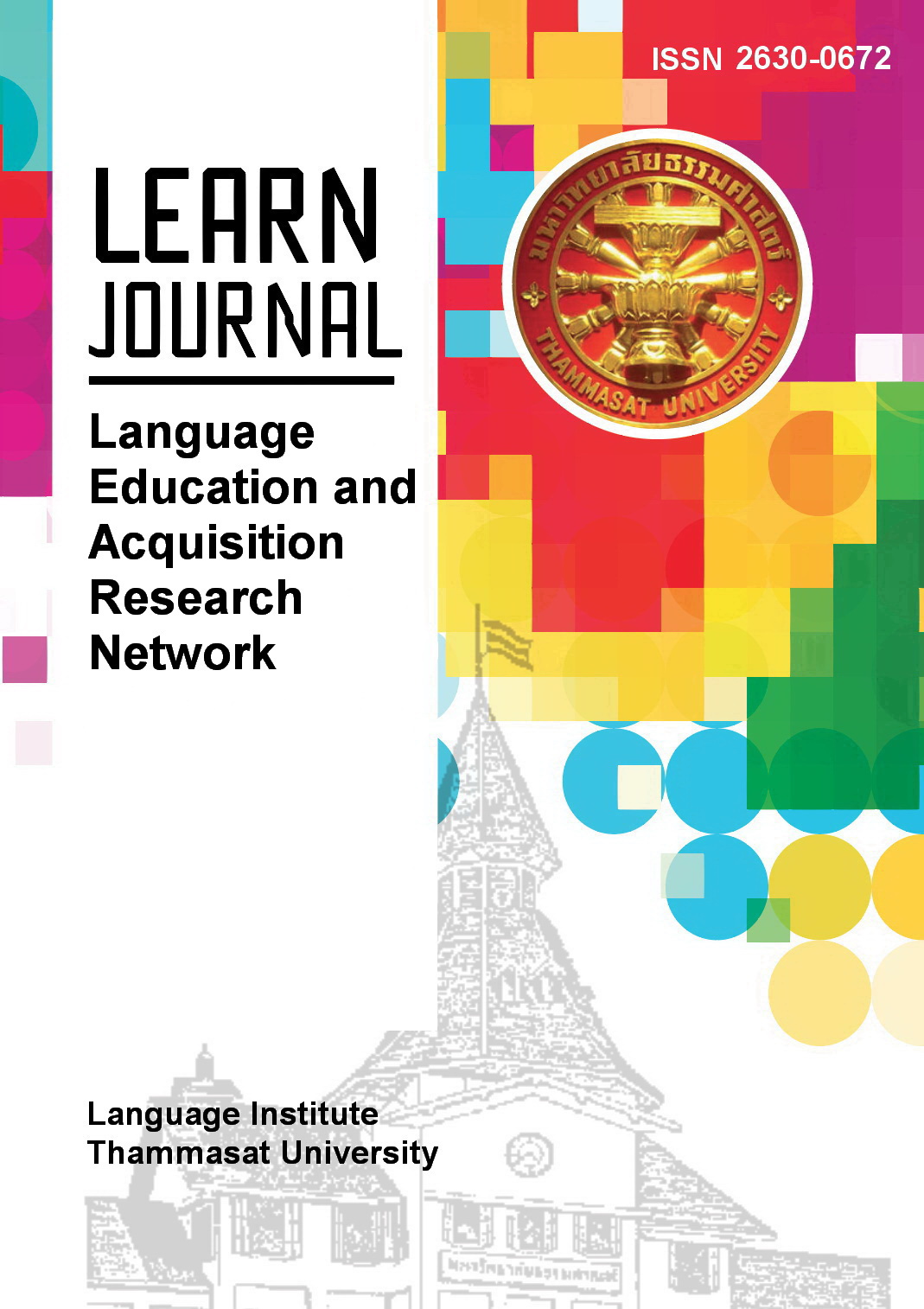Unpacking Psychological Factors Affecting EFL Students’ Online Language Learning Engagement
Main Article Content
Abstract
The learning modality has been greatly affected due to the Covid-19 pandemic, which has resulted in switching from offline learning to online learning. While much research has investigated factors affecting students’ online language learning engagement, a few studies have examined the EFL students’ discernment of psychological factors. Therefore, this study adopted a quantitative design for data collection and analysis to scrutinize the psychological factors affecting EFL students’ online learning engagement. A group of 174 EFL students conveniently chosen from three universities in Vietnam partook in answering a questionnaire whose data were quantitatively processed by the SPSS software. Three remarkable psychological factors, namely relaxation, self-confidence, and anxiety, were found to affect EFL students’ online language learning engagement at a high level, whereas motivation, satisfaction, enjoyment, and interest moderately impacted their online language learning engagement. Additionally, anxiety was found to have no correlation with satisfaction but had negative correlations with other factors. Meanwhile, enjoyment, relaxation, interest, motivation, self-confidence, and satisfaction were positively correlated with one another from strong to modest levels. This study suggests some recommendations in an attempt to enhance the quality of online learning modality in the research contexts and other similar ones.
Article Details
References
Agung, A. S. N., Surtikanti, M. W., & Quinones, C. A. (2020). Students’ perception of online learning during COVID-19 pandemic: A case study on the English students of STKIP Pamane Talino. SOSHUM: Jurnal Sosial Dan Humaniora, 10(2), 225–235. https://doi.org/10.31940/soshum.v10i2.1316
Alqurashi, E. (2018). Predicting student satisfaction and perceived learning within online learning environments. Distance Education, 40(1), 133–148. https://doi.org/10.1080/01587919.2018.1553562
Bandura, A. (1977). Self-efficacy: Toward a unifying theory of behavioral change. Psychological Review, 84(2), 191–215. http://dx.doi.org/10.1037/0033-295X.84.2.191
Bond, M. (2020). Facilitating student engagement through the flipped learning approach in K-12: A systematic review. Computers & Education, 151, 103819. https://doi.org/10.1016/j.compedu.2020.103819
Clément, R., Dörnyei, Z., & Noels, K. A. (1994). Motivation, self-confidence, and group cohesion in the foreign language classroom. Language Learning, 44(3), 417–448. https://doi.org/10.1111/j.1467-1770.1994.tb01113.x
Coman, C., ȚÎru, L. G., Meseșan-Schmitz, L., Stanciu, C., & Bularca, M. C. (2020). Online teaching and learning in higher education during the coronavirus pandemic: Students’ perspective. Sustainability, 12(24), 1–20. https://doi.org/10.3390/su122410367
Creswell, J. W. (2012). Educational research: Planning, conducting, and evaluating quantitative and qualitative research. Pearson.
Csikszentmihalyi, M. (1990). Flow: The psychology of optimal experience. Harper & Row.
Delone, W. H. & McLean, E. R. (2003). The Delone and Mclean model of information systems success: A ten-year update. Journal of Management Information Systems, 19(4), 9–30. https://doi.org/10.1080/07421222.2003.11045748
Dhawan, S. (2020). Online learning: A panacea in the time of COVID-19 crisis. Journal of Educational Technology Systems, 49(1), 5–22. https://doi.org/10.1177/0047239520934018
Dunford, E., & Thompson, M. (2010). Relaxation and mindfulness in pain: A review. Reviews in Pain, 4(1), 18–22. https://doi.org/10.1177/204946371000400105
Gardner, R. C. (1985). Social psychology and second language learning: The role of attitudes and motivation. Edward Arnold. https://doi.org/10.1037/h0083787
Jiang, P., Namaziandost, E., Azizi, Z., & Razmi, M. H. (2022). Exploring the effects of online learning on EFL learners’ motivation, anxiety, and attitudes during the COVID-19 pandemic: A focus on Iran. Current Psychology, 42, 2310-2324. https://doi.org/10.1007/s12144-022-04013-x
Kara, M. (2021). Revisiting online learner engagement: Exploring the role of learner characteristics in an emergency period. Journal of Research on Technology in Education, 54(sup1), S236–S252. https://doi.org/10.1080/15391523.2021.1891997
Kizilcec, R. F., P´erez-Sanagustín, M., & Maldonado, J. J. (2017). Self-regulated learning strategies predict learner behavior and goal attainment in Massive Open online courses. Computers & Education, 104, 18–33. https://doi.org/10.1016/j.compedu.2016.10.001
Krapp, A. (2002). Structural and dynamic aspects of interest development: Theoretical considerations from an ontogenetic perspective. Learning and Instruction, 12(4), 383–409. https://doi.org/10.1016/s0959-4752(01)00011-1
Krashen, S. D. (1981). Bilingual education and second language acquisition theory. Schooling and language minority students: A theoretical framework. Second Language Learning, 3(7), 51–79. Available at https://files.eric.ed.gov/fulltext/ED249773.pdf#page=63
Liu, N., & Pu, Q. (2020). Factors influencing learners’ continuance intention toward one-to-one online learning. Interactive Learning Environments, 1–22. https://doi.org/10.1080/10494820.2020.1857785
Martin, F., Sun, T., & Westine, C. D. (2020). A systematic review of research on online teaching and learning from 2009 to 2018. Computers & Education, 159, 104009. https://doi.org/10.1016/j.compedu.2020.104009
McDonough, S. (2007). Motivation in ELT. ELT Journal, 61(4), 369–371. https://doi.org/10.1093/elt/ccm056
Mercer, S., & Dörnyei, Z. (2020). Engaging Language Learners in Contemporary Classrooms. Cambridge University Press.
Moorhouse, B. L., & Kohnke, L. M. A. (2021). Responses of the English-language-teaching community to the COVID-19 pandemic. RELC Journal, 52(3), 359–378. https://doi.org/10.1177/00336882211053052
Piccoli, G., Ahmad, R., & Ives, B. (2001). Web-based virtual learning environments: A research framework and a preliminary assessment of effectiveness in basic IT skills training. MIS Quarterly, 25(4), 401. https://doi.org/10.2307/3250989
Rubio, F., Thomas, J. M., & Li, Q. (2017). The role of teaching presence and student participation in Spanish blended courses. Computer Assisted Language Learning, 31(3), 226–250. https://doi.org/10.1080/09588221.2017.1372481
Şener, B., Ertem, İ. S., & Ahmet, M.E.Ç. (2020). Online teaching experiences of ELT instructors. Journal of Educational Technology and Online Learning, 3(3), 340–362. https://doi.org/10.31681/jetol.770418
Spielberger, C. D. (1972). Anxiety as an emotional state. Anxiety, 23–49. https://doi.org/10.1016/b978-0-12-657401-2.50009-5
Worldometer. (2023, January 24). Reported cases and deaths by country or territory. https://www.worldometers.info/coronavirus/?utm_campaign=homeAdvegas1?
Yang, Y., Gao, Z., & Han, Y. (2021). Exploring Chinese EFL learners’ achievement emotions and their antecedents in an online English learning environment. Frontiers in Psychology, 12. https://doi.org/10.3389/fpsyg.2021.722622
Zapata-Cuervo, N., Montes-Guerra, I. M., Shin, H. H., Jeong, M. & Cho, M. (2021). Students’ psychological perceptions toward online learning engagement and outcomes during the COVID-19 pandemic: A comparative analysis of students in three different countries. Journal of Hospitality & Tourism Education, 1–15. https://doi.org/10.1080/10963758.2021.1907195


